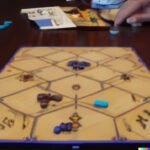Board games have been a popular form of entertainment for centuries, providing players with a mixture of skill, luck, and strategy. Developing board game strategies is essential for achieving success in these games, whether it’s a classic like chess or a modern hit like Settlers of Catan. In this article, we will explore the importance of board game strategies and provide expert advice on how to improve your gameplay.
As we delve into the world of board games, it’s crucial to understand the different types and categories that exist. From abstract strategy games to role-playing board games, each type requires a unique approach and set of skills. By analyzing these categories, players can gain insight into the varying levels of complexity and strategic depth found in different board games.
Understanding the rules and objectives of any board game is fundamental to developing effective strategies. Whether it’s controlling territory, collecting resources, or outmaneuvering opponents, a solid grasp of the game mechanics is essential. Additionally, knowing when to adapt your strategy based on changing circumstances can make all the difference between victory and defeat.
Types of Board Games
Board games come in a variety of categories, each with its own unique set of rules and gameplay. Understanding the different types of board games is important for developing effective strategies. By analyzing the categories, players can identify the specific skills and techniques needed to excel in each type of game.
Classic Board Games
Classic board games such as chess, checkers, and Go have stood the test of time and continue to be popular among players. These games often require a high level of strategic thinking, as well as a deep understanding of tactics and positional play. For example, in chess, players must carefully plan their moves to anticipate their opponent’s actions while also protecting their own pieces. Developing strong opening moves and endgame strategies are essential for success in classic board games.
Modern Board Games
Modern board games encompass a wide range of genres, from resource management and worker placement to storytelling and cooperative play. Games like Settlers of Catan, Ticket to Ride, and Pandemic have gained popularity for their innovative mechanics and engaging gameplay. Strategies for modern board games may involve long-term planning, negotiation with other players, or adapting to changing game conditions. This category requires players to think creatively and adapt their strategies based on the game’s evolving dynamics.
Party Games
Party games are designed for social interaction and often involve quick thinking, communication skills, and bluffing. Titles like Codenames, Telestrations, and Werewolf encourage players to engage with one another in lighthearted competition. Developing effective strategies in party games may involve reading other players’ body language or understanding group dynamics to advance one’s position in the game.
Understanding the categories of board games is crucial for developing board game strategies that cater to the specific demands of each type of game. By recognizing the diverse skills required for different categories, players can enhance their overall gameplay experience and improve their chances of winning.
Assessing the Game
Understanding the rules and objectives of a board game is crucial in developing effective strategies. Whether it’s a classic game like chess or a modern strategy game like Settlers of Catan, taking the time to assess the game’s rules and objectives will give you a solid foundation for developing winning strategies.
Study the Rules
The first step in assessing a board game is to thoroughly understand its rules. Take the time to read through the rulebook and familiarize yourself with all the different components, movements, and win conditions. Understanding the rules is essential for making informed decisions during gameplay.
Identify Objectives
Once you have a good grasp of the game’s rules, it’s important to identify its objectives. What are you trying to achieve in the game? Is it accumulating resources, controlling territory, capturing opponents’ pieces, or something else entirely? By understanding the primary objectives of the game, you can start to develop specific strategies that will help you achieve those goals.
Adaptability and Flexibility
Lastly, when assessing a board game, keep in mind that strategies may need to be adapted based on specific situations. While it’s important to have a plan in place, being flexible and adaptable during gameplay is equally crucial.
It’s vital to be able to pivot and adjust your approach based on your opponents’ moves and changing circumstances throughout the game. By mastering adaptability, you can stay one step ahead and increase your chances of success at the gaming table.
Building a Solid Foundation
When it comes to board games, having a strong foundation of basic strategies is essential for success. Whether you’re playing classic games like Chess or modern favorites like Settlers of Catan, understanding and implementing these fundamental tactics can make a significant difference in your gameplay. Below are some basic strategies that can help you improve your performance in a variety of board games:
- Control the Center: In many board games, controlling the center of the board gives you an advantage in terms of mobility and flexibility. By occupying the center squares or areas, you can exert influence over a larger portion of the game board, making it more difficult for your opponent to maneuver effectively.
- Develop Your Pieces: If you’re playing a game that involves pieces with different abilities or functions, such as Chess or Stratego, it’s crucial to develop and mobilize your pieces efficiently. Avoid keeping all your pieces clustered in one area, and instead focus on spreading them out strategically to cover more ground and create multiple threats.
- Understand Timing: Knowing when to make certain moves or actions is key to success in many board games. Whether it’s knowing when to play a certain card, move a specific piece, or execute a particular strategy, timing can be a critical factor in gaining an advantage over your opponents.
By incorporating these basic strategies into your gameplay, you can enhance your overall performance and increase your chances of winning. However, it’s important to remember that each game is unique, and different strategies may be more effective depending on the specific rules and objectives. As you continue developing board game strategies, be open to experimenting with different approaches and adapting your tactics based on the dynamics of each game.
With these foundational strategies under your belt, you’ll be better equipped to tackle the challenges posed by various board games and improve your overall gameplay performance.
- Applying foundational strategies such as controlling the center
- Developing pieces effectively
- Understanding timing in gameplay
Advanced Strategies
When it comes to developing board game strategies, advanced players know that simply relying on basic tactics may not always lead to victory. To take your gameplay to the next level, it’s crucial to explore and implement more advanced strategies that can outsmart your opponents and secure the win. Here are some key elements to consider when moving beyond the basics:
1. Risk Assessment: One of the hallmarks of advanced board game strategies is the ability to assess risks and rewards effectively. This involves calculating the potential consequences of each move, considering different scenarios, and making calculated decisions based on probability and potential payoffs.
2. Long-term Planning: Advanced players understand the importance of setting long-term goals and establishing a strategic roadmap for achieving them. This may involve sacrificing immediate gains for future benefits, creating alliances or partnerships with other players, or strategically positioning pieces or resources for a later advantage.
3. Resource Management: Whether it’s managing virtual currency in a digital board game or handling physical game pieces in a traditional tabletop game, resource management is a critical aspect of advanced strategies. This includes optimizing the use of available resources, conserving valuable assets, and leveraging resources efficiently to gain a competitive edge over opponents.
By incorporating these advanced strategies into your gameplay, you can elevate your performance and enhance your chances of success in a wide range of board games. Remember that mastering these tactics often requires practice, patience, and a willingness to learn from both victories and defeats – but the rewards can be well worth the effort. With time and dedication, you can become a formidable force in any board game setting by embracing advanced strategies as part of your gameplay approach.
Analyzing Opponents
Understanding your opponents and being adaptable is a crucial aspect of developing board game strategies. In any type of board game, whether it’s a strategy-based game like chess or a luck-based game like Monopoly, the ability to analyze your opponents’ moves and adjust your strategy accordingly can make the difference between winning and losing.
One important aspect of analyzing opponents is observing their playing style. By paying attention to how they approach the game, whether they are aggressive or defensive, you can tailor your own strategy to counter their moves effectively. For example, if you notice that an opponent consistently goes for high-risk moves, you may want to play more defensively to capitalize on their potentially reckless decisions.
Another key factor in adapting your strategy to your opponents is understanding their strengths and weaknesses. By recognizing what they excel at and where they struggle, you can make informed decisions about how to best approach the game. This might involve exploiting their weaknesses or finding ways to counteract their strengths in order to gain an advantage.
In addition, being adaptable also means being open to changing your initial strategy as the game progresses. Sometimes unexpected developments can occur during gameplay, and being flexible enough to pivot from your original plan can be essential for success. This requires a certain level of creativity and quick thinking, but it can greatly enhance your chances of winning.
| Board Game Strategies | Importance |
|---|---|
| Analyzing opponents | Understanding playing styles |
| Recognizing strengths and weaknesses | Gaining advantage |
| Being adaptable | Pivoting from original plan |
Tips and Tricks
When it comes to developing winning strategies for board games, there are a few expert tips and tricks that can make all the difference in your gameplay. One important aspect to consider is the level of complexity of the game you are playing.
For more complex games like chess or Settlers of Catan, it’s crucial to invest time in understanding the rules and objectives before attempting to develop a strategy. On the other hand, simpler games like Tic Tac Toe or Connect Four may require less extensive strategy development.
Another essential tip is to carefully analyze the game board or playing area. Understanding the layout and how pieces move or interact with each other is key to developing effective strategies. For example, in chess, knowing how each piece moves and captures others is fundamental to creating a winning plan. Additionally, paying attention to your opponent’s moves and considering possible future moves they might make is also crucial.
Lastly, seeking advice from experienced players or studying playthroughs can be incredibly helpful in developing winning strategies for board games. Many successful gamers share their insights and techniques online through videos and blogs, providing valuable tips and tricks for mastering different games. Taking advantage of these resources can give you a significant advantage when devising your own winning strategies.
| Expert Tips | Board Game Strategies |
|---|---|
| Understand complexity of the game | Invest time in understanding rules and objectives |
| Analyze game board | Paying attention to opponent’s moves |
| Seek advice from experienced players | Studying playthroughs for valuable insight |
Practice and Patience
Developing board game strategies requires a combination of practice and patience. Mastering the art of strategic gameplay doesn’t happen overnight, and it’s essential to understand that progress takes time. Whether you’re playing classic board games like Chess or branching out into modern strategy games like Settlers of Catan, dedicating time to practice and honing your skills is crucial for success.
Patience is key when it comes to mastering board game strategies. It’s important to remain calm and composed, even in the face of challenging opponents or setbacks during gameplay. With patience, players can carefully analyze their moves, consider different possibilities, and make thoughtful decisions that contribute to their overall strategy. Rushing through gameplay or becoming easily frustrated can often lead to subpar performance and missed opportunities for strategic advancement.
Practice is equally important for developing board game strategies. Consistent practice allows players to become more familiar with game mechanics, develop a deeper understanding of strategic concepts, and refine their decision-making skills.
By regularly engaging in gameplay and seeking opportunities to challenge themselves against different opponents, players can gradually improve their strategic abilities and adaptability in various gaming scenarios. Additionally, practice provides valuable opportunities for experimentation and learning from both successes and failures, ultimately contributing to a player’s growth as a strategist.
Conclusion
In conclusion, it is clear that developing board game strategies is essential for success in any game. Whether it is a classic game like Chess or a modern strategy game like Settlers of Catan, having a solid understanding of the rules, objectives, and different types of strategies can greatly improve gameplay. By mastering basic and advanced strategies, players can take their gameplay to the next level and increase their chances of winning.
Furthermore, understanding the importance of adaptability when analyzing opponents is crucial for success in board games. Being able to adjust one’s strategies based on the actions of opponents can be the difference between victory and defeat. Additionally, following expert advice and implementing tips and tricks can also help in developing winning strategies.
Ultimately, practice and patience are key to mastering board game strategies. Like any skill, developing effective strategies for board games takes time and dedication. With persistence and a willingness to learn from both wins and losses, players can continue to improve their gameplay and become formidable opponents in any board game they choose to play.
Frequently Asked Questions
How Do You Strategize in Board Games?
Strategizing in board games involves analyzing the game’s rules, understanding your opponents’ moves, and planning your own to achieve victory. It requires foresight, adaptability, and sometimes a bit of luck to outsmart your opponents.
What Are 3 Elements That Make a Board Game Good?
Three elements that make a board game good are balance, player engagement, and replayability. A good board game should provide a fair chance for all players to win, keep everyone involved throughout the game, and offer enough variety to be enjoyed multiple times.
How Do You Develop a Board Game?
Developing a board game involves brainstorming creative ideas, testing prototypes with different groups of people, refining the game mechanics based on feedback, and considering production and presentation aspects. It’s important to balance creativity with practicality to create a successful board game.

I love playing all kinds of games – from classics like Monopoly to modern favourites like Ticket to Ride.
I created this blog as a way to share my love of board games with others, and provide information on the latest releases and news in the industry.





